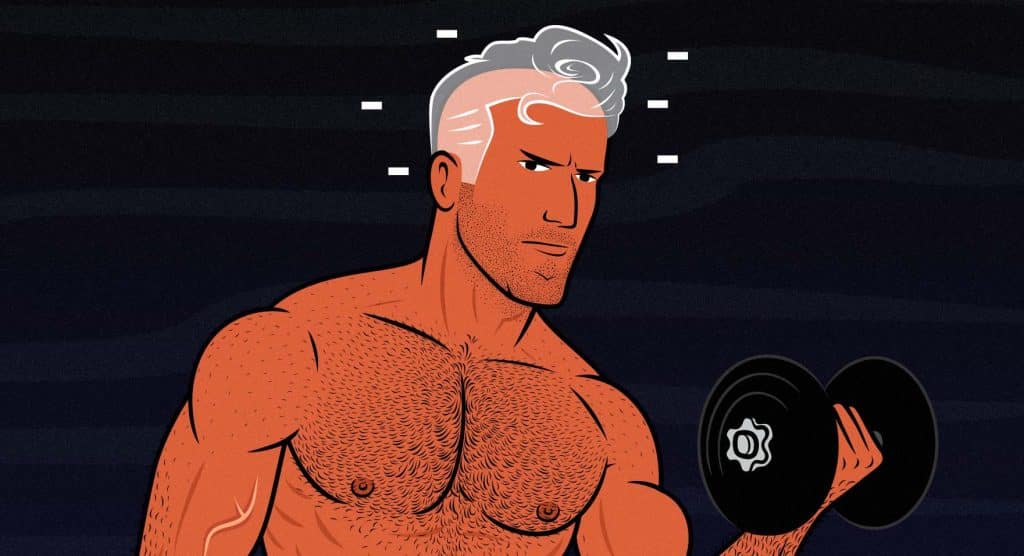
Intermittent Fasting May Cause Hair Loss: Research Explained
I was excited about intermittent fasting when it first started becoming popular. I don’t have an appetite when I wake up, and I love the feeling of black coffee on an empty stomach.
It didn’t work very well for me, though. I’m a naturally skinny guy with a small stomach and a smaller appetite. I started falling behind on protein and calories, and my afternoon and evening meals became uncomfortably large, which left me feeling sluggish. I also got acid reflux.
I have quite a few clients who enjoy fasting, though, so I keep up with the research. So far, it seems to have a neutral effect on health and fat loss (study). It seems to have a slightly negative effect on muscle gain, but mostly because fasting makes it hard to eat enough protein and calories. If you can eat enough, you’ll build muscle just fine.
This latest study is strange, though. It seems that intermittent fasting causes hair loss, at least in some people, under some circumstances.
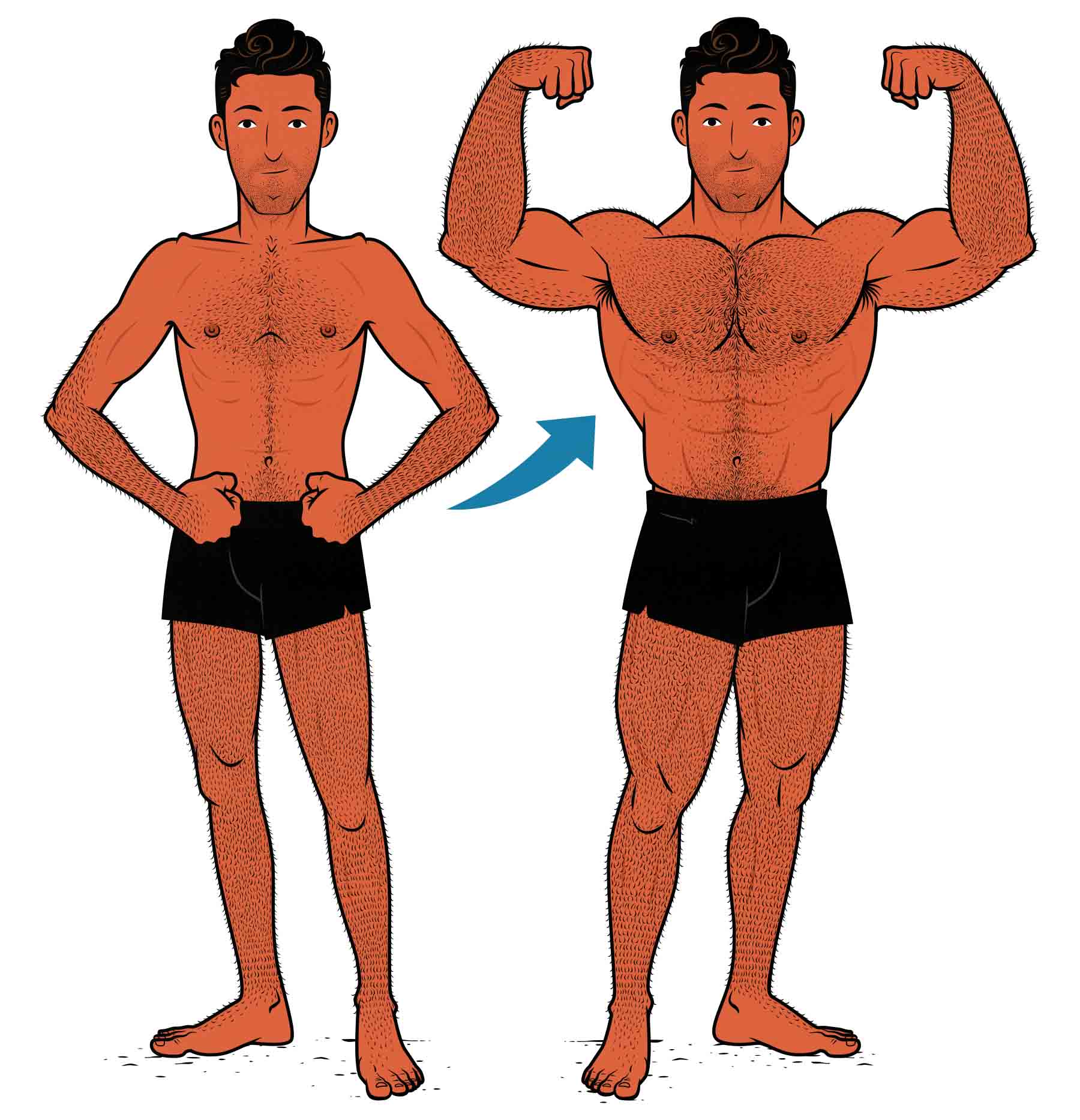
Rodent Research
For example, one study found that when mice ate in a steady calorie deficit, their hair grew like normal. But when the same deficit was created using intermittent fasting, their hair growth slowed, with more intense fasting protocols slowing it even further. Over time, this led to thinner, more damaged hair.
You can see it here:
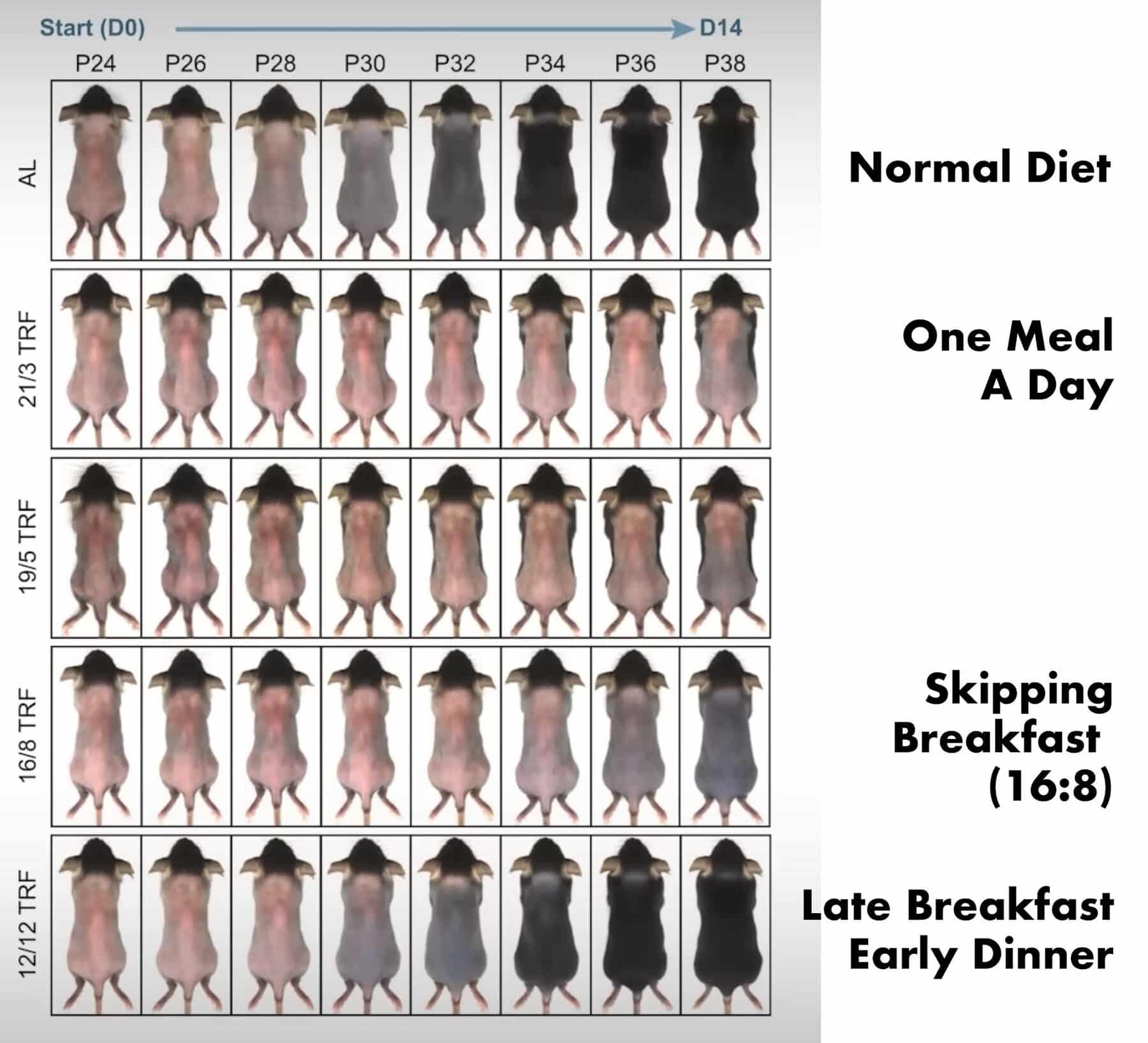
The researchers shaved the mice, as you can see on the left. Then they let the hair regrow over time, as you can see to the right. Some of the mice ate with relatively normal meal schedules (top and bottom), whereas others were put on different intermittent fasting protocols (middle).
But these are mice. Mice have much faster metabolisms. A mouse skipping breakfast is more comparable to a person fasting for a couple of days.
So, they also studied people.
Hair Loss in Humans
The second study was on 49 men and women between the ages of 18 and 60 (study). The researchers had them experiment with three different diets for ten days, keeping track of how their hair changed.
- Maintenance Diet: People maintained their weight. No fat loss. Hair health was normal.
- Normal Fat-Loss Diet: People lost fat. Hair was fine. No statistically significant differences in hair quality.
- Intermittent Fasting: The participants did 18:6 fasting, where they would fast for 18 hours and then eat during a 6-hour window. Some of the participants experienced some hair miniaturization and hair loss.
You can see what that looks like here:
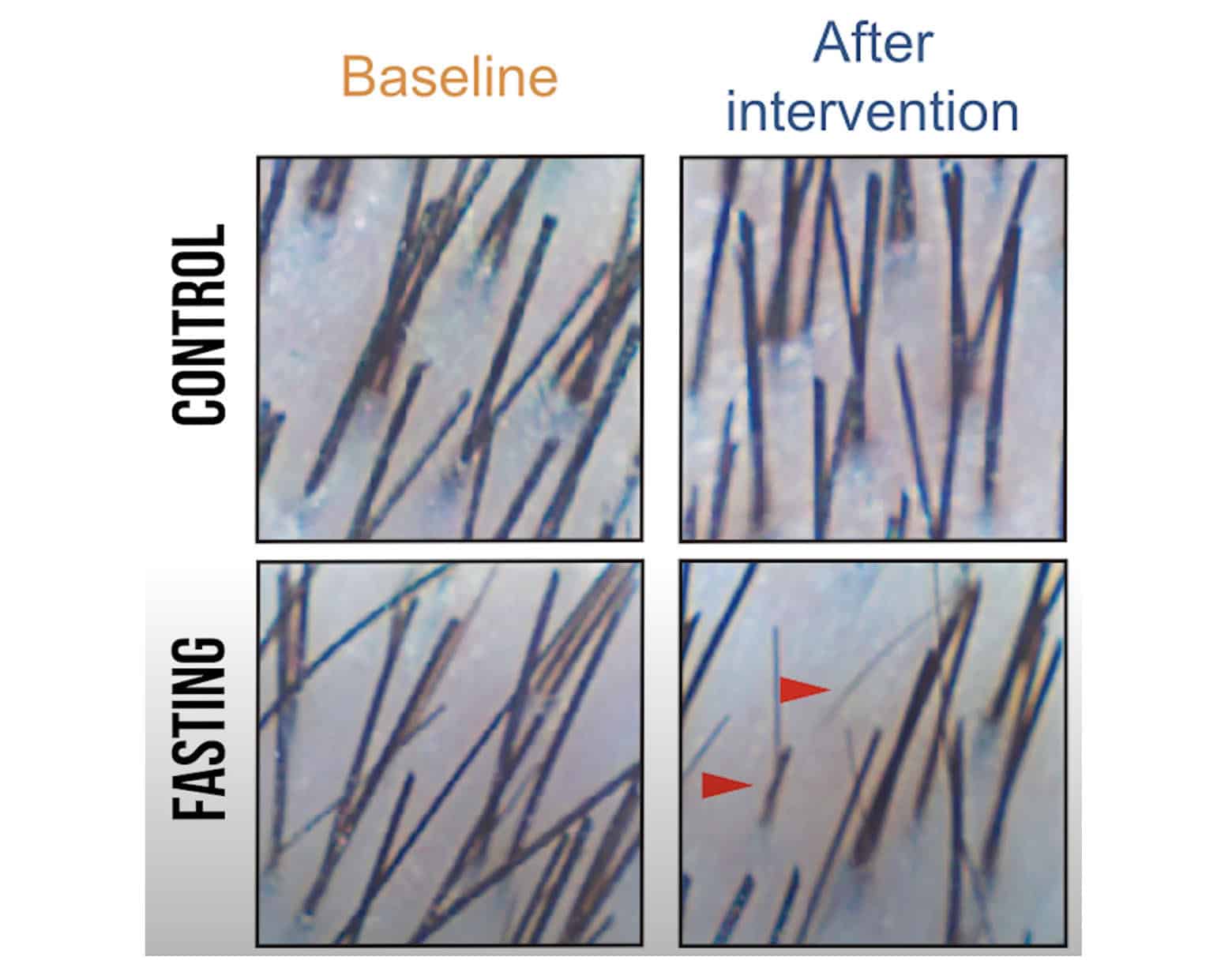
The effects in humans weren’t as dramatic as in mice, but there was still a measurable effect, even with just 10 days of fasting. It seems that during fasting, your body prioritizes sending nutrients to where they’re needed most. Hair doesn’t make the cut.
This isn’t the only study to find that intermittent fasting harms hair. Here’s another one:
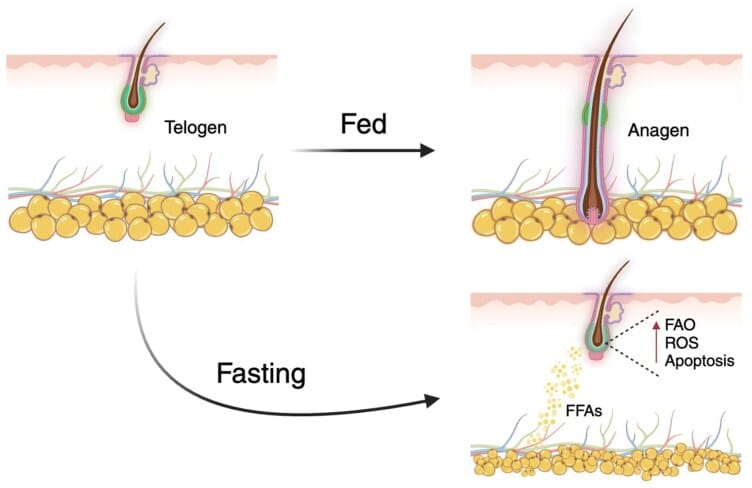
It seems that intermittent fasting doesn’t burn more fat overall, but it does burn more fat in unusual places, like on your scalp. And when you burn the fat surrounding your hair follicles, it can damage local stem cells and cause hair loss.
One of the proposed benefits of intermittent fasting is fat cell apoptosis (death), but it also seems to cause stem cell apoptosis in our hair follicle stem cells.
That makes me wonder if intermittent fasting causes fat loss in other strange places. For example, I wonder if we might lose more fat in our face, making us look gaunt.
But I don’t want to read too much into just a few studies. It wouldn’t surprise me if this research fails to replicate. We’ll have to wait and see.
Note: this isn’t male pattern baldness. It’s a general reduction in the health of your hair follicles. It affects men and women equally. You’d expect thinner, patchier hair, not a receding hairline. And when you return to a steady eating pattern, hair quality tends to recover.
Your Mileage May Vary
After this study came out, I looked at the online chatter. Quite a few people claimed their hair got noticeably thinner when they started intermittent fasting. Others said it made no difference. If you try it, and if you care about your hair, then it’s something to keep an eye on.
I experimented with intermittent fasting for a few months and didn’t notice a difference. My wife also tried it for a few months, though, and her hair started to seem more damaged. I’m not sure if that was from the intermittent fasting. Both of us started having a simple protein shake for breakfast instead. I’ll give you the recipe in a second.
How to Avoid Hair Loss
There may be some ways to offset the hair loss. Topical antioxidants like vitamin E seem to help reduce the follicle damage from intermittent fasting. A nutrient-dense diet and generally healthy lifestyle may help too. And some people seem more susceptible than others.
Here’s what I would do:
- Intermittent fasting is okay, especially when trying to lose fat (guide here). Skipping breakfast doesn’t have a consistent positive or negative impact on body composition or health, making it a viable option for people who prefer it. But if you’re falling behind on protein or calories or micronutrients, or if you don’t feel good, or if you don’t like it, then try the next option.
- If you want a light breakfast, try having a light protein shake. This shake feels just as light as intermittent fasting, and the theobromine in the cocoa gives a caffeine-like surge of energy, but it’s smoother and lasts much longer. You also get ahead on protein, and you get some super healthy polyphenols. It might help you build muscle, too. One study found that having a protein-rich breakfast increased muscle growth by 37% (study).
- If you lift first thing in the morning, try having a light protein shake with a fruit (like a banana). It can also help to have a bit of extra fluid. Being fully hydrated improves lifting performance. It’s okay if that fluid is caffeinated.
- If you do cardio first thing in the morning, try doing some of it fasted. Definitely have some fluid beforehand, and it’s okay if some of that fluid is caffeinated, but save the calories for afterwards. I do almost all of my cardio this way, but even just once per week is great for improving your metabolic flexibility. You can start eating as soon as you finish your cardio. I have a light shake afterwards.
- If you like having a big breakfast, absolutely go for it. There’s no need to intentionally hold back on calories at breakfast. It’s perfectly healthy to have proportionally more of your calories in the morning. And if it saves you from needing to eat a big meal right before bed, it might even improve your sleep.
The Beastly Protein Shake
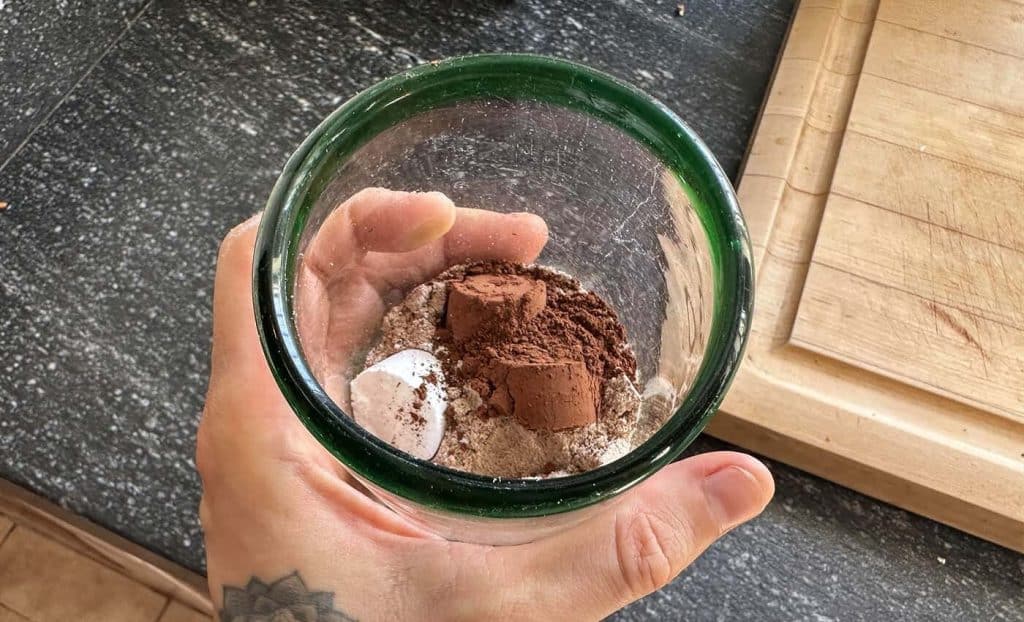
We have a full article with breakfast recipes, but this is the shake I use to somewhat mimic the benefits of intermittent fasting. I’m not a morning person, I don’t have much of an appetite when I wake up, and I like the feeling of having a relatively empty stomach while I’m doing my morning work. I’m exactly the sort of guy that intermittent fasting appeals to. That’s why I enthusiastically hopped onto the wagon when it first became popular.
But intermittent fasting wasn’t working very well for me. It was hard to hit my calorie and protein goals. My workout performance wasn’t as good, and I stopped gaining strength. And the energy boost felt a bit twitchy and frazzled.
I went back to eating breakfast, but it was a hassle, and I was having to force-feed myself, and I felt a bit sluggish afterwards. I built more muscle, got stronger, and had better workouts, and my productivity was fine, but I didn’t like it as much.
So, I concocted this protein shake recipe. I find it gives me more energy than intermittent fasting, makes my overall diet healthier, and helps me hit my protein and calorie goals. I’ve been having it every morning for the past year.
It works great for bulking, cutting, or recomping. It’s also great for your skin, digestion, and hair.
Here’s the recipe:
- 2 scoops of chocolate protein powder (like whey).
- 8 grams of unsweetened cocoa powder.
- 2 grams of camu camu powder.
- 5 grams of creatine.
- Room temperature water.
That gives you roughly:
- Calories: 260 kcal
- Protein: 52 grams
- Carbs: 8 grams
- Fat: 4 grams
- Fibre: 3 grams
Whey is a convenient, effective, and easily digested source of protein, and it also has calcium, potassium, phosphorous, and a couple of B vitamins. It tends to improve health and digestion, mostly by promoting muscle growth and fat loss (study). Having 2–3 scoops per day is totally fine (article).
Cocoa makes the protein shake more bitter and intense, giving it a more macho taste. But more importantly, it’s rich in flavonoids, a powerful polyphenol. These flavonoids reduce inflammation and help you produce more nitric oxide (NO). This improves blood vessel function, reduces blood pressure, gives you better muscle pumps, and improves glycemic control and blood lipids (meta, meta). Cocoa is also a rich source of micronutrients, including magnesium. And the theobromine (similar to caffeine) gives a gentle surge of vitality.
Camu camu is a fruit that’s naturally rich in vitamin C. Most people don’t eat enough vitamin C for their general health (90 mg), and physically active people benefit from about twice as much (200 mg). A couple grams of camu camu powder gives you a few hundred milligrams of vitamin C—more than eating a few oranges—which is enough to optimize athletic performance and health (study). It’s also an important part of collagen production, which is great for your connective tissues, skin, and hair (study, study, study, study).
Creatine improves athletic performance, muscle growth, and brain health, and it might improve energy in the morning.
Water works best when it’s warm enough for all of the ingredients to dissolve when mixed. Room temperature water should be good for that.
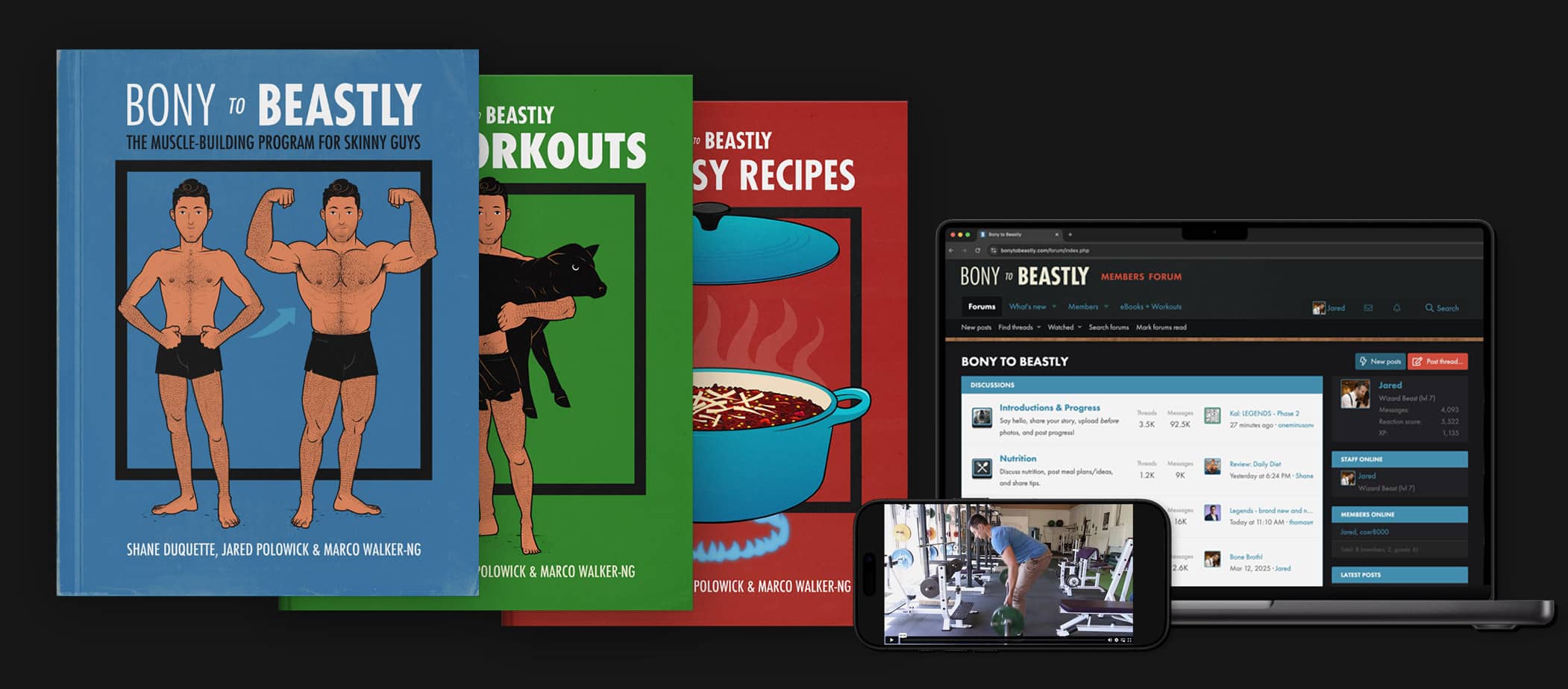
If you want more, we have a full nutrition guide and recipe book included with our Bony to Beastly: Foundational Muscle-Building Program and Legends: Health & Aesthetic Program. We’ve got more breakfast recipes (like a homemade protein bar you can prepare in bulk), and we’ve also got a bunch of great options for lunch and dinner, including our favourite meal-prep meals (where you cook a dozen servings at once).
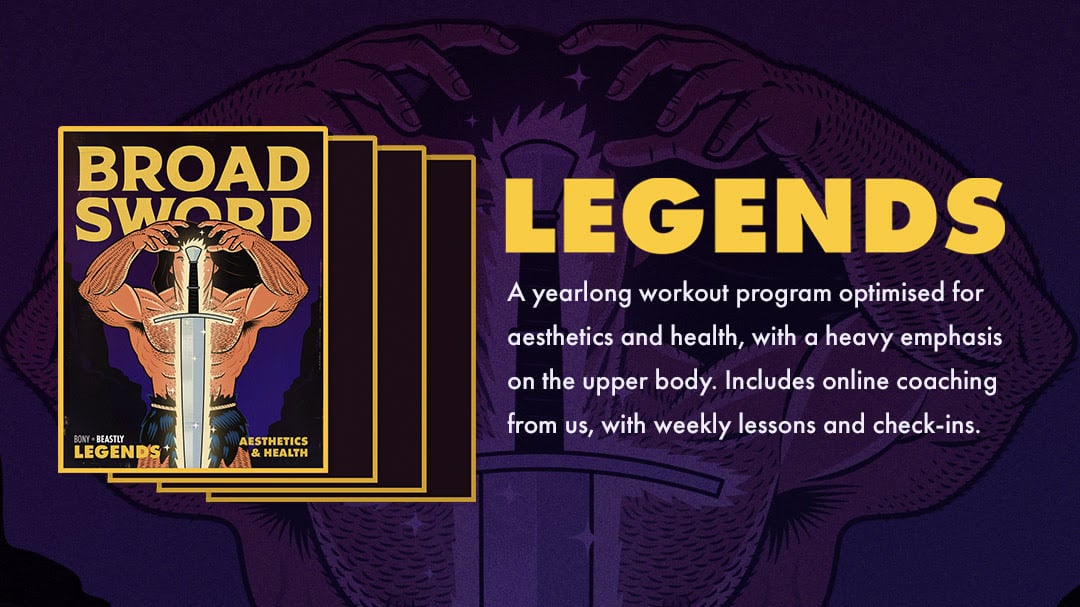
We take this stuff seriously. We aren’t just trying to give you generically healthy meals, we’re trying to give you enough of every macronutrient and micronutrient you need to build muscle, burn fat, improve your health, enhance your appearance, and maximize your performance.
We can help you eat a great diet, whether you like intermittent fasting, low-carb, eat a plant-based diet, or have digestive issues (like IBD or GERD). Our nutrition guide and recipe book are great places to start, but both of these programs also come with one-on-one support in our online coaching community.
Alright, that’s it for now. Feel free to ask questions in the comments.
Shane Duquette is the founder of Outlift, Bony to Beastly, and Bony to Bombshell, each with millions of readers. He's a Certified Conditioning Coach (CCC), has gained 70 pounds, and has over a decade of experience helping more than 15,000 people build muscle. He also has a degree in fine arts, but those are inversely correlated with muscle growth.

Muscle-Building Mini-Course via Email
Sign up for our 5-part muscle-building mini-course that covers everything you need to know about:
Here are some related articles